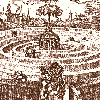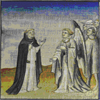In recognition of Delbert Russell
Dear conference participants,
In the name of the organizing committee, Laurie and I would like to thank all of you for making the MARGOT conference such a stimulating and successful event. We were very pleased to see so much discussion of and debate about the various projects that were presented. In the spirit of collaboration and in order to keep the momentum going, could we please ask you to send us a brief project description (no more than one paragraph) complete with your URL or URLs, so that we can add them to our site? Please send this information to Christine (cmcwebb@uwaterloo.ca) by Friday July 9, 2010.
Because of the positive feedback that we received from many of you, we
have now decided to make the MARGOT conference a regular event on a
three year cycle. Just like at this conference, there will be a
specific topic that will govern each meeting. The next conference will
take place in June 2013 once again at Barnard College. The tentative
topic is: Women and Community 700-1700, in Print and Online.
We hope you all had a good trip back home and we look forward to seeing you at the next MARGOT conference in June 2013!
Best wishes,
Christine McWebb
June 16-17, 2010
Barnard College, Columbia University
New York, USA
We look forward to welcoming you to New York for the third international MARGOT conference.
The Organizing Committee
Laurie Postlewate
Christine McWebb
Delbert Russell
Helen Swift
Scholarly Focus
During this two day conference, we will explore the use of digital resources in teaching and research in the Middle Ages. We will focus especially on the current state of the art in digital studies, on teaching and curricula matters, and on recent new and expected future developments in the field. Topics may include:
- digital paleography - translation and dictionary projects
- digital projects in the visual and performance arts (material culture, image annotation tools, paratextual information, etc.)
- text corpora (creation of a corpus, search systems, etc.)
- encoding of medieval manuscripts and printed texts (use of XML, TEI and extensions of these protocols)
- management and preservation of digital resources
- information design and modeling
- the cultural impact of the new media
- software studies
- the role of digital humanities in academic curricula
- funding and sustainability of long-term projects





